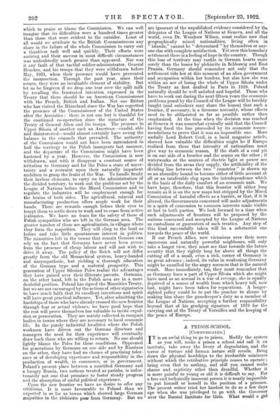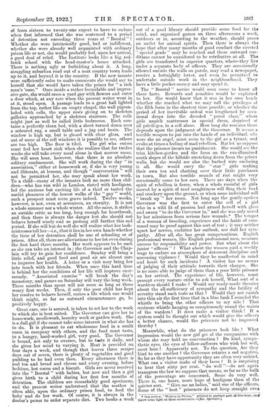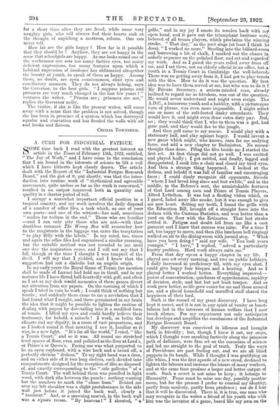I T is an awful thing to go to prison. Modify
the system as you will, make a prison a school and call it an institute, take away the livery of degradation, and the terror of torture and human nature still recoils. Bring down the physical hardships to the irreducible minimum without which the retributive principle ceases to operate ; bring even that to nothing, and still you cannot make shame and captivity other than dreadful. Whether it is more painful to young or old it is difficult to say. For a free and technically innocent person it is nearly impossible to put himself or herself in the position of a prisoner. The present writer tried her hardest to do so a few days ago when she was privileged to go with the Governor over the Borstal Institute for Girls. What would a girl of from sixteen to twenty-one expect to have to endure when first informed that she was sentenced to a period of detention not exceeding three years at " Borstal " ? Whether she were intrinsically good, bad or indifferent, whether she were already well acquainted with ordinary prison life or not, she would probably feel, upon her arrival, a good deal of relief. The Institute looks like a big, red- brick school with the head-master's house attached. There is nothing ugly or forbidding about it. A long, straggling suburban road out of a neat country town leads up to it, and beyond it is the country. If the new inmate were sufficiently calm to make comments she would say to herself that she would have taken the prison for "a rich man's 'ouse." Once inside a rather formidable and impres- sive gate, she would cross a yard gay with flowers and enter a door which, at any rate when the present writer went in at it, stood open. A passage leads to a great hall lighted from the top, rather like an empty chapel, the wall pigeon- holed with cells, the upper rows giving on to skeleton galleries approached by a skeleton staircase. The cells might just as well be called little bedrooms. Each con- tains a perfectly clean bed, with a sheet turned down over a coloured rug, a small table and a jug and basin. The window is high up, but is glazed with clear glass, and out of sonic of the cell windows it is possible to see, others are too high. The floor is tiled. The girl who enters must feel her heart sink when she realizes that for twelve weeks she will take every meal alone in that narrow room. She will soon hear, however, that there is no absolute solitary confinement. She will work during the day "in association," either at housework or, if she is very young and illiterate, at lessons, and though " conversation " will not be permitted her, she may speak about her work. To a child—many of the inmates look no more than chil- dren—who has run wild in London, rioted with hooligans, led the anxious but exciting life of a thief or tasted the sordid pleasures of the lowest walks of the " gay " world, such a prospect must seem grave indeed. Twelve weeks, however, is not, even at seventeen, an eternity. It is not a whole summer nor a whole winter. All the same, it strikes an outside critic as too long, long enough for heartbreak, and then there is always the danger lest she should not behave herself wisely and so prolong still further this sad period. If she will but do well she will realize what her task- mistresses tell her—i.e., that it lies in her own hands whether the time of her detention shall be one of schooling or of prison. After all, there are alleviations to her lot even during the first hard three months. Her work appears to be such as she can take an interest in ; the Governor and the Chap- lain will try to gain her confidence. Sunday will bring a little relief, and good food and good air are almost sure to improve her health. A letter or a visit may bring her into touch with her friends. When once this hard time is behind her the conditions of her life will improve enor- mously. "Associated exercise" will break the day's monotony, and games on Saturday will vary the long week. Three months thus spent will not seem so long as those weary first weeks. Then, if only the poor child has kept her resolve to behave herself, comes a life which one would think might, so far as outward circumstances go, be positively happy.
Great care, one is assured, is taken to set her to the work to which she is best suited. The Governor can give her to housework, needlework, laundry work or garden work. She is a dull girl if she cannot take some interest in what she has to do. It is pleasant to eat wholesome food in a sunlit room in company with others, and the food must taste, to a hungry, hard-worked girl, very good. The Governor is bound, not only to oversee, but to taste it daily, and she gives her mind to varying it. Meat is provided on four days a week, and though that leaves three ntaigre days out of seven, there is plenty of vegetables and good pudding to be had even then. Every afternoon there is real tea and bread and cheese and every evening, before bedtime, hot cocoa and a biscuit. Girls are never received into the " Borstal " with babies, but now and then a girl gives birth to a child during her first few months of detention. The children are remarkably good specimens, and the present writer understood that the mother is often able, upon the ordinary prison food, to feed the baby and do her work. Of course, it is always in the doctor's power to order separate diet. Two books a week out of a good library should provide some food for the mind, and organized games on three afternoons a week, outdoors or in, according to the weather, should prove an outlet for animal spirits. Then there is always the hope that after many months of good conduct the coveted "special grade" may be reached and these outward con- ditions cannot be considered to be retributive at all. The girls are transferred to superior quarters, where•they live under a separate body of officers. They are occasionally allowed outside the walls on parole, may read a newspaper, receive a fortnightly letter, and even be permitted to undertake outside work in the neighbourhood. They have a little pocket-money and may spend it.
The " Borstal " novice would soon come to know all these facts. Rewards and penalties would be explained to her. She would know that it was in her own hands whether she reached what we may call the privileges ol the fifth form in the shortest time possible, or whether the period of her inevitable ordeal was lengthened by occa- sional drops into the dreaded "penal class," where girls unpick mattresses in special dress, deprived ol all privileges, in a cell alone. How long she remains there depends upon the judgment of the Governor. It seems 3 terrible weapon to put into the hands of an individual, whc were she an angel, must seem to the girl as a tyrant, and evoke at times a feeling of mad rebellion. But let us suppose that the prisoner incurs no punishment. She would see the trim kitchen-garden and the farm on the sun-illumined south slopes of the hillside stretching down from the prison walls, but she would see also the barbed wire enclosing it all. She would envy the " star " girls making their own tea and chatting over their little purchases in town. But also terrible sounds of riot might very occasionally come to her ears. There are days when the spirit of rebellion is fierce, when a whole roomful of girls moved by a spirit of mad naughtiness will fling their food and crockery upon the ground, or when some individual will "break up ' her room. Not long ago the gently-spoken Governor was the first to enter the cell of a girl who in a wild fit of passion had armed herself with glass and sworn "to do the Governor in," and she was only saved by her adroitness from serious face wounds.* The temper of a woman of breeding, experience and the habit of com- mand may be proof against this sort of test ; it may neither upset her nerves, embitter her outlook, nor dull her sym- pathy. After all, she has great compensations. English professional women, like English professional men, measure success by responsibility and power. But what about the junior " officers " ? What about the women paid a weekly wage to endure an atmosphere of deterrent discipline and unceasing vigilance ? Would they be unaffected in mind and heart by such incidents ? A visitor has no means of judging of their attitude towards their charges. She is no more able to judge of them than a poor little prisoner on her arrival. The experience of life, however, must prompt every mature critic to ask herself, What sort of a wardress should I make ? Would my ready-made theories about the all-sufficiency of sympathy and the futility of severity stand such tests as that ? Would they not vanish into thin air the first time that in a blue funk I sounded the whistle to bring the other officers to my side ? That ominous whistle hanging so conspicuously round the waists of the warders ! It does make a visitor think ! If a system could, be thought out which would give the officers a better chance, would the prisoners not be improved thereby ?
Meanwhile, what do the prisoners look like ? What impression would the new girl get of the companions with whom she may hold no conversation ? Do kind, sympa- thetic eyes, the eyes of fellow-sufferers who wish her well, meet hers ? Apparently not. To the question, Are they kind to one another ? the Governor returns a sad negative. So far as they have opportunity they are often very unkind. What can a visitor make of their faces ? It is surprising to hear that sixty per cent. "do well "—do not again transgress the law we suppose that means, so far as the bulk of the percentage are concerned. Some do very well. There is, one hears, more hope of hooligans than of the quieter sort. "Give me no ladies," said one of the officers. Some of the " best " prisoners do not keep straight even • Our review, " Women in Prison," printed in another Dart ot this WM. ma, throw some light on these oceurronees.--Ign. Spectator.] for a short time after they are freed, while some very naughty girls, who will always feel their hearts sink at the thought of unpicking a mattress, reform. One can never tell.
How far are the girls happy ? How far is it possible that they should be ? Anyhow, they are not happy in the sense that schoolgirls are happy. As one looks round one of the workrooms one sees too many furtive eyes, too many deficient expressions, too many features upon which a habitual expression of insolence has obliterated altogether the beauty of youth, to speak of them as happy. Among them, no doubt, are open countenances, clear eyes and conciliatory manners. They do not always belong, says the Governor, to the best girls. "I suppose prisons and prisoners are very much changed in the last few years ? " ventures the writer. "Prisons are ; prisoners are not," replies the Governor sadly.
The visitor, if she is like the present writer, will come away with a sense that the problem is not solved, though she has been in presence of a system which has destroyed squalor and starvation and has flooded the walls with air and books and flowers.
CECILIA TOWNSEND.




































 Previous page
Previous page